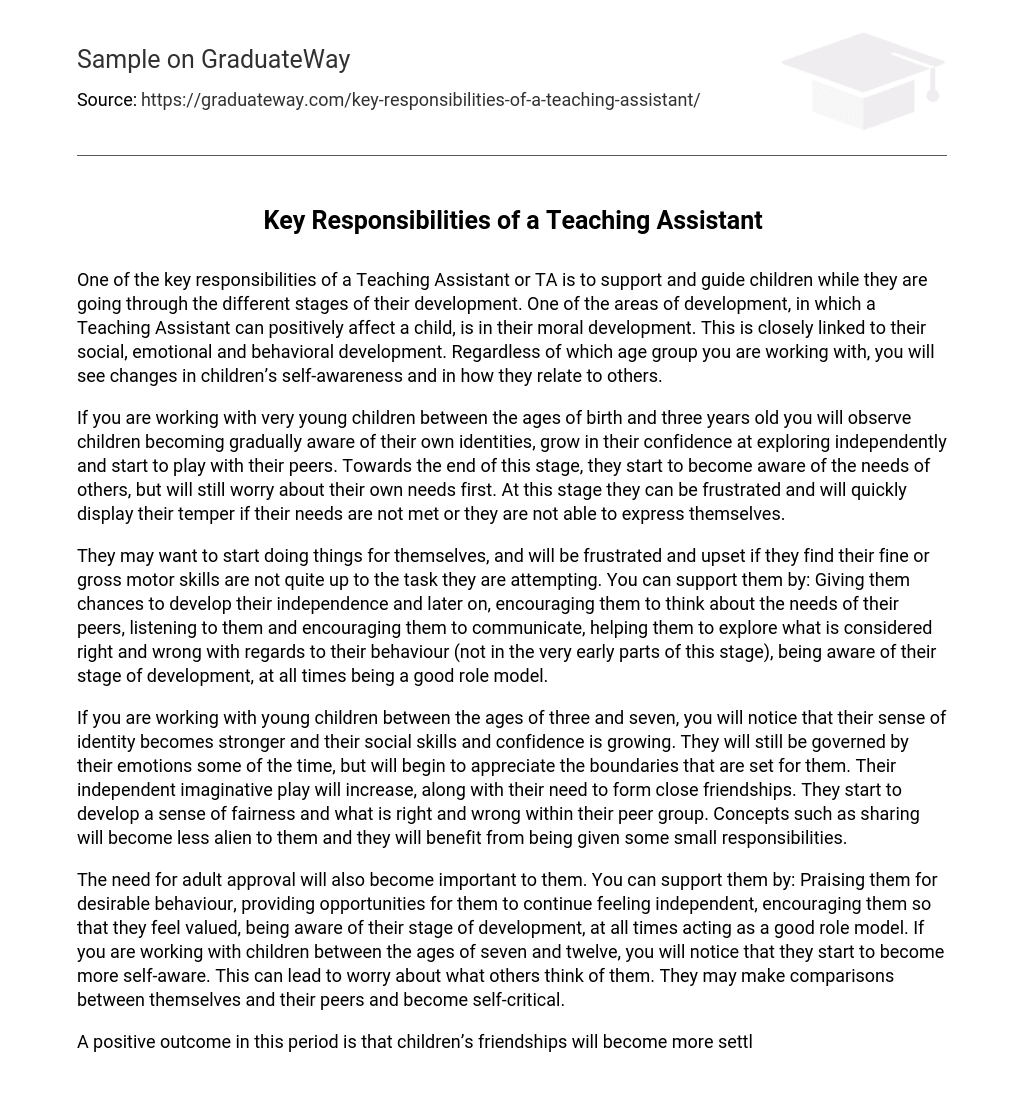One of the key responsibilities of a Teaching Assistant or TA is to support and guide children while they are going through the different stages of their development. One of the areas of development, in which a Teaching Assistant can positively affect a child, is in their moral development. This is closely linked to their social, emotional and behavioral development. Regardless of which age group you are working with, you will see changes in children’s self-awareness and in how they relate to others.
If you are working with very young children between the ages of birth and three years old you will observe children becoming gradually aware of their own identities, grow in their confidence at exploring independently and start to play with their peers. Towards the end of this stage, they start to become aware of the needs of others, but will still worry about their own needs first. At this stage they can be frustrated and will quickly display their temper if their needs are not met or they are not able to express themselves.
They may want to start doing things for themselves, and will be frustrated and upset if they find their fine or gross motor skills are not quite up to the task they are attempting. You can support them by: Giving them chances to develop their independence and later on, encouraging them to think about the needs of their peers, listening to them and encouraging them to communicate, helping them to explore what is considered right and wrong with regards to their behaviour (not in the very early parts of this stage), being aware of their stage of development, at all times being a good role model.
If you are working with young children between the ages of three and seven, you will notice that their sense of identity becomes stronger and their social skills and confidence is growing. They will still be governed by their emotions some of the time, but will begin to appreciate the boundaries that are set for them. Their independent imaginative play will increase, along with their need to form close friendships. They start to develop a sense of fairness and what is right and wrong within their peer group. Concepts such as sharing will become less alien to them and they will benefit from being given some small responsibilities.
The need for adult approval will also become important to them. You can support them by: Praising them for desirable behaviour, providing opportunities for them to continue feeling independent, encouraging them so that they feel valued, being aware of their stage of development, at all times acting as a good role model. If you are working with children between the ages of seven and twelve, you will notice that they start to become more self-aware. This can lead to worry about what others think of them. They may make comparisons between themselves and their peers and become self-critical.
A positive outcome in this period is that children’s friendships will become more settled within more easily identifiable groups. You can support them by: Continuing to help them grow in their self-esteem by offering praise and encouragement, being very firm and fair when dealing with friendship or behavioral issues, being approachable and letting them know you are there for them to talk to, encouraging them to imagine how other people are feeling, being sensitive to the rapid changes in their social and emotional needs and their moral understanding, at all times being aware of their stage of development and acting as a good role model.
If you are working with children between the ages of twelve and sixteen, you will notice that girls, in particular, will start to show signs of adult physical maturity, however they may still behave in an immature fashion. Their sense of needing to ‘belong’ to their friendship groups will increase, as will their need for guidance, even if they tell you otherwise. At this tage they can be quite vulnerable, as they work out how to handle new expectations and social situations that they come across. You can support them by: Continuing to be approachable and letting them know you have time for them, continuing to be sensitive to the rapid changes in their social and emotional needs and their moral understanding, at all times being aware of their stage of development and acting as a good role model.
If you are working with children who are approaching adulthood (sixteen to nineteen), they will need guidance and advise some of the time because they will lack experience. Some individuals may also lack emotional maturity and not always know how to handle the social situations and moral dilemmas they come across. You can support them by: Being aware of their stage of development, continuing to be fair and firm, continuing to be approachable at all times, being a good role model.





